
Central Asia, also known as Central Eurasia, is a subregion of Asia that stretches from the Caspian Sea in the southwest and European Russia in the northwest to Western China and Mongolia in the east, and from Afghanistan and Iran in the south to Siberia in the north. It includes Kazakhstan, Kyrgyzstan, Tajikistan, Turkmenistan, and Uzbekistan. The countries as a group are also colloquially referred to as the "-stans" as all have names ending with the Persian suffix "-stan" in both respective native languages and most other languages. Central Asia borders Eastern Europe to the west, West Asia to the southwest, South Asia to the southeast, North Asia to the north, and East Asia to the east.

Uzbekistan, officially the Republic of Uzbekistan, is a doubly landlocked country located in Central Asia. It is surrounded by five countries: Kazakhstan to the north, Kyrgyzstan to the northeast, Tajikistan to the southeast, Afghanistan to the south, and Turkmenistan to the southwest, making it one of only two doubly landlocked countries on Earth, the other being Liechtenstein. Uzbekistan is part of the Turkic world, as well as a member of the Organization of Turkic States. Uzbek, spoken by the Uzbek people, is the official language and spoken by the majority of its inhabitants, while Russian and Tajik are significant minority languages. Islam is the predominant religion, and most Uzbeks are Sunni Muslims.

The Armed Forces of the Republic of Uzbekistan, is the name of the unified armed forces of Uzbekistan, consisting of the Ground Force and the Air and Air Defence forces under the defence ministry. Paramilitary units include the National Guard, a Frontier Service and a River Force. It is reported to be the largest and the strongest in Central Asia.

Uzbekistan joined the Commonwealth of Independent States in December 1991. However, it is opposed to reintegration and withdrew from the CIS collective security arrangement in 1999. Since that time, Uzbekistan has participated in the CIS peacekeeping force in Tajikistan and in United Nations-organized groups to help solve the Tajik and Afghan conflicts, both of which it sees as posing threats to its own stability. Uzbekistan is an active supporter of U.S. efforts against worldwide terrorism and joined the coalitions which have dealt with both Afghanistan and Iraq. It is a member of the United Nations, the Euro-Atlantic Partnership Council, Partnership for Peace, and the Organization for Security and Cooperation in Europe (OSCE). It belongs to the Organisation of Islamic Cooperation (OIC) and the Economic Cooperation Organization, which comprises 7 Central Asian countries: Pakistan, Uzbekistan, Kazakhstan, Turkmenistan, Afghanistan, Kyrgyzstan and Tajikistan. It is a founding member of and remains involved in the Central Asian Union, formed with Kazakhstan and Kyrgyzstan, joined in March 1998 by Tajikistan.

The Shanghai Cooperation Organisation (SCO) is a Eurasian political, economic, international security and defence organization established by China and Russia in 2001. It is the world's largest regional organization in terms of geographic scope and population, covering approximately 24% of the area of world and 42% of the world population. As of 2024, its combined nominal GDP accounts for around 23%, while its GDP based on PPP comprises approximately 36% of the world's total.

Kyrgyzstan, officially the Kyrgyz Republic, is a landlocked country in eastern Central Asia, lying in the Tian Shan and Pamir mountain ranges. Bishkek is the capital and largest city. Kyrgyzstan is bordered by Kazakhstan to the north, Uzbekistan to the west, Tajikistan to the south, and China to the east and southeast. Ethnic Kyrgyz make up the majority of the country's over 7 million people, followed by significant minorities of Uzbeks and Russians.

Islam Abduganiyevich Karimov was an Uzbek politician who served as the first president of Uzbekistan, from the country's independence in 1991 until his death in 2016. He was the last First Secretary of the Communist Party of Uzbekistan from 1989 to 1991, when the party was reconstituted as the People's Democratic Party of Uzbekistan (O‘zXDP); he led the O‘
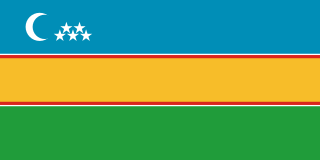
Karakalpakistan, officially the Republic of Karakalpakistan, is an autonomous republic of Uzbekistan. It spans the northwestern portion of Uzbekistan. Its capital is Nukus. Karakalpakstan has an area of 166,590 km2 (64,320 sq mi), and has a population of about 2 million people. Its territory covers the classical land of Khwarazm, which in classical Persian literature was known as Kāt (کات).
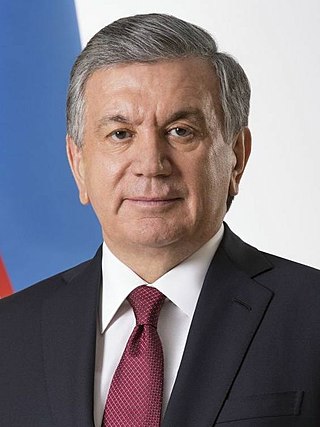
Shavkat Miromonovich Mirziyoyev is an Uzbek politician who has served as President of Uzbekistan and Supreme Commander-in-Chief of the Armed Forces of Uzbekistan since 14 December 2016. Previously, Mirziyoyev led the government as a Prime Minister of Uzbekistan from 2003 to 2016.
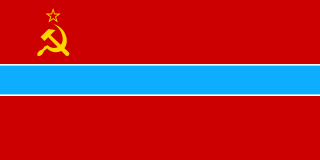
The Uzbek Soviet Socialist Republic, also known as Soviet Uzbekistan, the Uzbek SSR, UzSSR, or simply Uzbekistan and rarely Uzbekia or Red Uzbekistan, was a union republic of the Soviet Union. It was governed by the Uzbek branch of the Soviet Communist Party, the legal political party, from 1925 until 1990. From 1990 to 1991, it was a sovereign part of the Soviet Union with its own legislation.
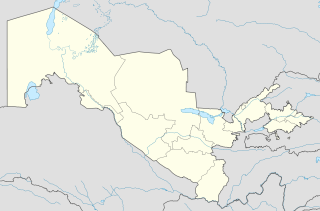
Uzbekistan is divided into 12 regions, 1 autonomous republic, and 1 independent city.

The Uzbekistan national football team represents Uzbekistan in international football and is controlled by the Uzbekistan Football Association, the governing body for football in Uzbekistan.
The Kyrgyzstan national football team, officially recognised by FIFA and AFC as Kyrgyz Republic, represents Kyrgyzstan in international football and is controlled by the Kyrgyz Football Union, a member of the Asian Football Confederation (AFC) and Central Asian Football Association.
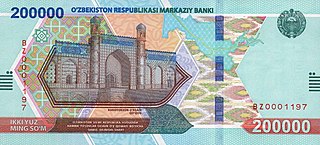
The sum is the official currency of Uzbekistan. Uzbekistan replaced the ruble with the sum at par in on 16 July 1994. No subdivisions of this sum were initially issued and only banknotes were produced, in denominations of 1, 3, 5, 10, 25, 50, 100, 200, 500, 1,000, 5,000, and 10,000 sum. Further series, however, have introduced coins and a subunit, the tiyin. Because it was meant to be a transitional currency, the design was rather simplistic.

The Oliy Majlis is the parliament of Uzbekistan. It succeeded the Supreme Council of the Republic of Uzbekistan in 1995, and was unicameral until a reform implemented in January 2005 created a second chamber.
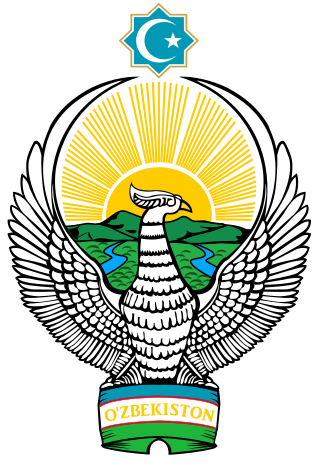
The president of the Republic of Uzbekistan is the head of state and executive authority in Uzbekistan. The office of President was established in 1991, replacing the position of Chairperson of the Presidium of the Supreme Soviet of the Uzbek SSR, which had existed since 1925. The president is directly elected for a term of seven years, by citizens of Uzbekistan who have reached 18 years of age.

Lesbian, gay, bisexual, and transgender (LGBT) people face widespread prosecution in Uzbekistan. Same-sex sexual activity between men is illegal in Uzbekistan. The punishment is up to three years in prison. Uzbekistan is one of just two post-Soviet states in which male homosexual activity remains criminalised, along with Turkmenistan.

The regions (viloyat) of Uzbekistan are divided into 175 districts (tuman). The districts are listed by regions, in the general direction from the west to the east.

The Uzbekistan national under-23 football team represents Uzbekistan in international U-23 football competitions. The team is controlled by the Uzbekistan Football Association, and is a member of the Asian Football Confederation.

Visitors to Uzbekistan must obtain a visa from one of the Uzbekistan diplomatic missions or online unless they come from one of the visa exempt countries.
















